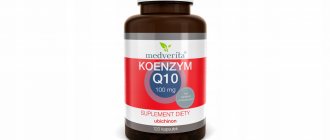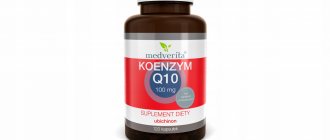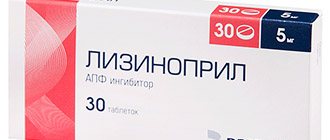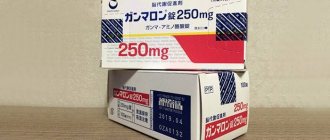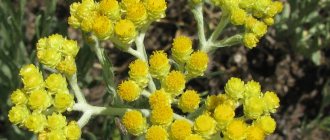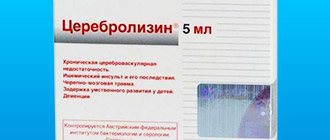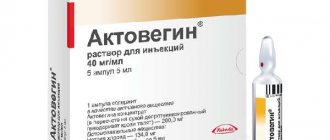A dry, obsessive cough often accompanies respiratory diseases. It can also occur due to allergies, stress, or exposure to irritating substances. Thanks to this protective reaction, the body tries to get rid of viruses, bacteria or dust.
When the cough becomes continuous and painful, taking a medicine that suppresses the cough reflex, for example, Omnitus, is indicated. This group of drugs should be taken with caution to avoid complications.
Compound
| Modified-release film-coated tablets | 1 table |
| active substance: | |
| butamirate citrate | 20 mg |
| excipients: lactose monohydrate - 218.5 mg; hypromellose - 70 mg; talc - 10 mg; magnesium stearate - 8 mg; colloidal silicon dioxide anhydrous - 2 mg; povidone - 1.5 mg | |
| film shell: hypromellose - 5.105 mg; talc - 4.7 mg; ethylcellulose - 3.14 mg; macrogol - 1.253 mg; titanium dioxide - 1.041 mg; dye “Sunset” yellow (E110) (11%) - 1.261 mg |
| Modified-release film-coated tablets | 1 table |
| active substance: | |
| butamirate citrate | 50 mg |
| excipients: lactose monohydrate - 230.5 mg; hypromellose - 85 mg; talc - 10 mg; magnesium stearate - 12 mg; colloidal silicon dioxide anhydrous - 6 mg; povidone - 1.5 mg | |
| film shell: hypromellose - 5.305 mg; talc - 4.95 mg; ethylcellulose - 3.183 mg; macrogol - 1.273 mg; titanium dioxide - 1.061 mg; crimson dye (“Ponso” 4R) (E124) - 2.122 mg; brown varnish (sunset yellow dye (E110), azorubine dye (E122), black dye (E151) - 0.106 mg |
| Syrup | 1 ml |
| active substance: | |
| butamirate citrate | 0.8 mg |
| excipients: sorbitol 70% (non-crystallizing) - 405 mg; glycerol - 290 mg; sodium saccharinate - 0.6 mg; benzoic acid - 1.15 mg; vanillin - 0.6 mg; anise oil - 0.15 mg; ethanol 96% - 3 µl; sodium hydroxide - 0.1 mg; purified water - up to 1 ml |
Description of the drug
Omnitus is sold in three dosage forms:
- tablets that contain 50 or 20 mg of butamirate citrate;
- syrup, 1 ml of which contains 0.8 mg of butamirate citrate;
- drops, 1 ml contains 5 mg of butamirate citrate.
The tablets have a round shape, a special yellow or orange coating. Packed in blisters of 10 pieces.
The syrup can be purchased in 200 ml bottles complete with a measuring spoon and instructions for use. It is a clear, colorless or slightly yellowish liquid with a vanilla aroma.
Drops are sold in 20 ml bottles equipped with a dosing device. They are a solution with a specific odor without color or with a slight yellow tint.
Pharmacokinetics
Absorption is high. After oral administration of syrup at a dose containing 150 mg of butamirate citrate, Cmax in plasma of the main metabolite (2-phenylbutyric acid) is observed after 1.5 hours and is 6.4 mcg/ml, when taking a modified-release tablet (50 mg) - 9 h and 1.4 μg/ml, respectively. T1/2 for syrup - 6 hours, for tablets - 13 hours. There is no cumulative effect. Butamirate citrate is rapidly hydrolyzed in plasma to 2-phenylbutyric acid and diethylaminoethoxyethanol. Both of these metabolites, which also have an antitussive effect, are significantly bound to plasma proteins, which explains their long-term presence in the plasma. Subsequently, the main metabolite 2-phenylbutyric acid is oxidized to 14C-p-hydroxy-2-phenylbutyric acid. All three metabolites are excreted by the kidneys, with the acidic metabolites being primarily glucuronic acid.
How does Omnitus work?
The therapeutic effect of the drug is due to the properties of the main active ingredient - butamirate, which is a centrally acting anti-cough agent.
Therefore Omnitus:
- directly affects the cough center and blocks debilitating coughing attacks;
- does not cause attachment or addiction;
- gives a bronchodilator effect;
- facilitates the breathing process;
- increases oxygen content in the blood.
The medicine does not depress respiratory function, does not have a sedative effect, and does not contribute to the retention of sputum in the bronchi.
Directions for use and doses
Inside. The tablets are taken before meals without chewing.
Tablets, 20 mg
Adults - 2 tables. 2–3 times a day; children over 12 years old - 1 table. 3 times a day; from 6 to 12 years - 1 table. 2 times a day.
Tablets, 50 mg
Adults - 1 table. every 8–12 hours
Syrup
Adults - 6 scoops (30 ml) 3 times a day; children over 9 years old (40 kg) - 3 scoops (15 ml) 4 times a day; from 6 to 9 years (22–30 kg) - 3 scoops (15 ml) 3 times a day; from 3 to 6 years (15–22 kg) - 2 measuring spoons (10 ml) 3 times a day.
Contraindications for use
The drug is not prescribed for hypersensitivity to any of the substances included in the tablets, drops or syrup.
Also contraindicated are:
- period of lactation and breastfeeding;
- for tablets with a dosage of 50 mg – age up to 18 years;
- for tablets with a dosage of 20 mg – preschool age;
- for tablets – impaired absorption of monosaccharides in the gastrointestinal tract, lactose intolerance, lactase deficiency;
- for drops – age up to two months;
- for syrup – age up to three years.
Since the syrup contains ethanol, it is prescribed with caution to persons with liver pathologies, brain diseases, alcohol dependence, epilepsy, who are prone to developing dependence on medications.
Price, where to buy, reviews
The price of Omnitus depends on the dosage form, the pricing policy of the pharmacy chain, and the region of sales. Tablets start from 225 rubles. for 10 pieces, syrup - from 230 rubles, drops - from 290 rubles. It is more convenient to buy medicine on the pharmacy website.
According to patient reviews, the drug works well for paroxysmal coughing at night, against the background of throat irritation caused by ARVI. There is a variety of dosage forms, an affordable price, and a minimal number of side effects.
Doctors consider Omnitus a modern and effective drug recommended for lingering dry cough.
Special instructions, side effects
Omnitus is approved for use in patients with diabetes mellitus, as it contains sorbitol and saccharin.
Simultaneous use with expectorants is prohibited in order to prevent stagnation of sputum in the bronchi, which can cause bronchospasm and the development of an infectious process in the lungs.
The medicine may cause drowsiness and dizziness, so caution should be exercised in activities that require increased alertness or speed of reaction.
In some cases, during treatment, undesirable effects may occur in the form of nausea or diarrhea, allergic reactions, itching, dizziness, urticaria, and various skin rashes.
Omnitus is stored at a temperature of 15-25°C, tablets - for two years from the date of release, syrup - five years, drops - two and a half years.
Omnitus (modified high-p.p.pl/vol.50mg tab. No. 10)
A country
Serbia
The country of production may vary depending on the batch of goods. Please check with the operator for detailed information when confirming your order.
Active substance
Butamirat
Compound
Release form: Modified-release film-coated tablets 20 mg or 50 mg. 10 tablets in a PVC/AL blister. 1 blister, together with instructions for use, is placed in a cardboard pack. Syrup 0.8 mg/ml. 200 ml of the drug in a dark glass bottle of hydrolytic group III, sealed with a plastic cap with first-opening control. On the top side of the cap there is a diagram for opening the bottle. 1 bottle along with a measuring spoon (volume 5 ml, with a line for a volume of 2.5 ml) and instructions for use in a cardboard pack. Composition: Tablets 1 modified-release film-coated tablet 20 mg contains: Active substance Butamirate citrate 20 mg; Excipients Lactose monohydrate – 218.5 mg, hypromellose – 70.0 mg, talc – 10.0 mg, magnesium stearate – 8.0 mg, colloidal silicon dioxide, anhydrous – 2.0 mg, povidone – 1.5 mg; Shell composition Hypromellose – 5.105 mg, talc – 4.700 mg, ethylcellulose – 3.140 mg, macrogol – 1.253 mg, titanium dioxide – 1.041 mg, sunset dye yellow [E 110] (11%) – 1.261 mg. 1 modified-release film-coated tablet 50 mg contains: Active substance Butamirate citrate 50 mg; Excipients Lactose monohydrate – 230.5 mg, hypromellose – 85.0 mg, talc – 10.0 mg, magnesium stearate – 12.0 mg, colloidal silicon dioxide, anhydrous – 6.0 mg, povidone – 1.5 mg, shell composition: hypromellose – 5.305 mg, talc – 4.950 mg, ethylcellulose – 3.183 mg, macrogol – 1.273 mg, titanium dioxide – 1.061 mg, crimson dye [Ponceau 4R] [E 124] – 2.122 mg, brown varnish (sunset yellow dye [E110], azorubine dye [E122], black dye [E151]) – 0.106 mg .Syrup 1 ml of syrup contains: Active substance Butamirate citrate 0.8 mg; Excipients Sorbitol 70% (non-crystallizing) - 405.00 mg, glycerol - 290.00 mg, sodium saccharin - 0.60 mg, benzoic acid - 1.15 mg, vanillin – 0.60 mg, anise oil – 0.15 mg, ethanol 96% – 3.00 µl, sodium hydroxide – 0.10 mg, purified water – up to 1.00 ml. Quantity per package: 10 tablets.
pharmachologic effect
An antitussive, it has an expectorant, moderate bronchodilator and anti-inflammatory effect. Butamirate citrate is neither chemically nor pharmacologically related to opium alkaloids and has a direct effect on the cough center, improves spirometry and blood oxygenation.
Indications for use
Dry cough of any etiology (for colds, flu, whooping cough and other conditions). Suppression of cough in the preoperative and postoperative period, during surgical interventions, bronchoscopy.
Mode of application
Inside. The tablets are taken before meals without chewing. The syrup contains 1 measuring spoon (5 ml volume):————————————————————————————— —- Children | Dosage————————————|———————————————————-from 3 to 6 years (15-22 kg) | 2 scoops (10 ml) 3 times a day from 6 to 9 years (22-30 kg) | 3 scoops (15 ml) 3 times a day over 9 years (40 kg) | 3 scoops (15 ml) 4 times a day————————————|——————————————————— Adults | Dosage ———————————|———————————————————— | 6 scoops (30 ml) 3 times a day——————————————————————————————— Tablets 20 mg:———— ———————————————————————————— Children | Dosage————————————|———————————————————- from 6 to 12 years | 1 tablet 2 times a day over 12 years | 1 tablet 3 times a day————————————|——————————————————— Adults | Dosage ———————————|———————————————————— | 2 tablets 2-3 times a day——————————————————————————————— Tablets 50 mg:——————— —————|———————————————————— Adults | Dosage ———————————|———————————————————— | 1 tablet every 8-12 hours———————————————————————————————
Interaction
No drug interactions have been described for butamirate. During treatment with the drug, it is not recommended to drink alcoholic beverages, as well as medications that depress the central nervous system (hypnotics, antipsychotics, tranquilizers and other drugs).
Side effect
Exanthema, nausea, diarrhea, dizziness, allergic reactions.
Contraindications
Syrup: hypersensitivity, pregnancy (I trimester), lactation period, children under 3 years of age. Modified-release film-coated tablets: hypersensitivity, pregnancy, lactation period, children under 6 years of age - 20 mg tablets, up to 18 years of age - tablets 50 mg.
Overdose
Symptoms: nausea, vomiting, drowsiness, diarrhea, dizziness, decreased blood pressure. Treatment: activated carbon, saline laxatives, symptomatic therapy (according to indications).
special instructions
Patients with diabetes mellitus can be prescribed the drug, because Sorbitol and saccharin are used as a sweetener in the syrup; the tablets contain lactose. The Omnitus drug contains 3 μl (or 0.003 ml) of ethanol per 1 ml. If the dosage is observed, the patient takes a single dose of 0.03 ml of ethanol (in 10 ml of syrup). There is a danger for persons with liver disease, alcoholism, epilepsy, brain diseases, as well as for pregnant women and children.
